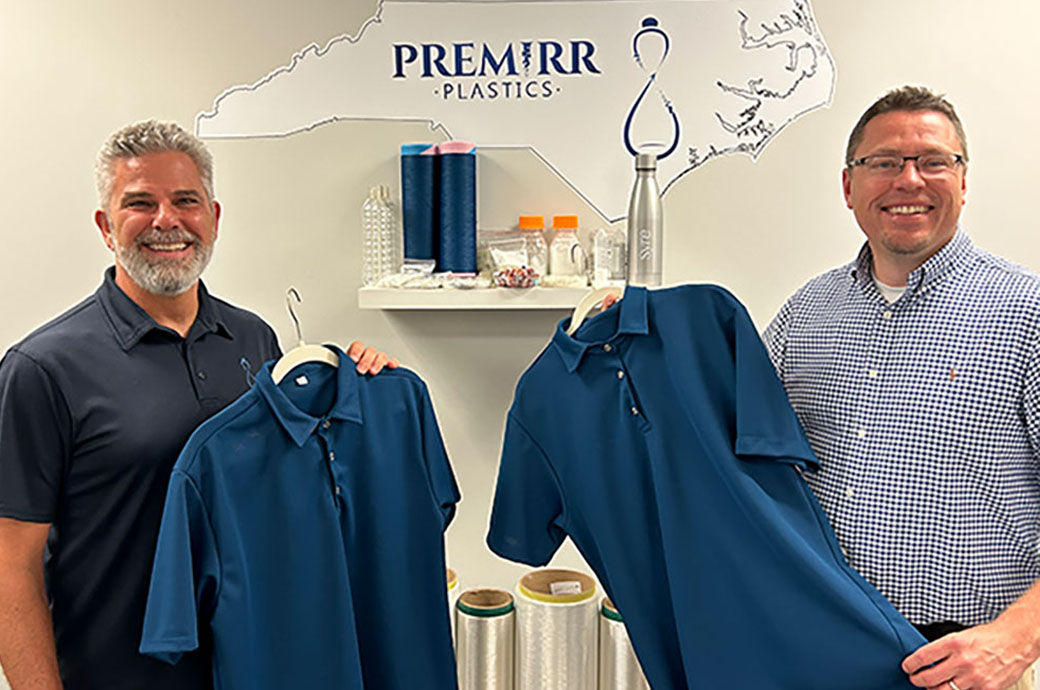
Their goal is to revolutionise the polyester production industry through sustainability and efficiency. Their start up, formerly known as Premirr Plastics, focuses on breaking down and reusing polyethylene terephthalate (PET) in everyday items. They merged with Syre in April 2024 to transform textile-to-textile production.
“The world is filled with polyester products that desperately require a recycling story. The shirt you’re wearing, the carpet under your feet, the uppers on your running shoes — Polyester is everywhere, and that’s PET,” Parrott explained.
The two designed a system that uses heat and chemistry to help break down the polyester polymer into its base molecule, or monomer. Think of a polymer as a chain of 1,000 paper clips, and a monomer as a singular paper clip within the 1,000. Their technology can break down that chain into individual paper clips that can be reformed into new chains.
Their partnership with Syre lets them carry out their revolutionary process at a faster and more efficient rate, allowing them to make bigger waves in their quest for sustainability.
With their new way of producing polyester, Parrott and Luft can reduce carbon footprint, water waste, and fossil fuel use. This method is different from other long-standing companies, whose techniques may not be as efficient or sustainable.
The pair began their story together at Carolina: Parrott was an assistant professor in the School of Medicine’s radiology department, and Luft was a research professor in the Eshelman School of Pharmacy.
They crossed paths while collaborating on a project for engineered nanoparticles in the lab of Joseph DeSimone while he was still at UNC-Chapel Hill. As they continued to work together, they built a strong friendship and partnership. Then, with chemistry and determination, they created the technology that gave them their true start.
Their dynamic is one of balance — when Parrot provides a lofty answer, Luft follows it with a concise one — and their appreciation for Carolina remains unwavering.
Parrott and Luft received a $50,000 grant from Innovate Carolina’s KickStart programme, an initiative that gives research-fueled startups the boost they need to turn their ideas into tangible businesses.
“KickStart helped springboard Premirr plastics. If it wasn’t for UNC and this programme, we would not be here” Parrott said.
While it was difficult for them to leave the Carolina community to pursue their business full-time, they both agree that the decision gave them a platform to grow professionally and personally.
And grow they did, moving out of their roles as professors and carrying the lessons they learned into the world of entrepreneurship. They built a company and a concept that grew steadily for nearly a decade until it caught the eye of a textile recycling giant.
Polyester production has been around for decades, and it is not an industry that is readily open to change.
Now, in a time where people are becoming more environmentally conscious, electric cars are on the rise, and younger generations are advocating for sustainable practices, Syre’s methods resonate with many.
But they continue to face challenges, like the recycling habits of everyday people. Out of all the textile fibre across the globe, only 1 per cent comes from recycled textiles. Most end up incinerated or in landfills, contributing to 10 per cent of all carbon dioxide emissions.
Common household items like shirts, couches, and anything with polyester in it can all be reused through Syre’s new technology. Even unconventional items, like seatbelts and seat cushions in cars contain polyester.
With an emphasis on curbing fast fashion, Syre has recently begun working with clothing brand H&M to make their practices more sustainable. The company — known for its everyday fashion wear — has adopted Syre’s textile-to-textile solution, and Parrott and Luft hope the rest of the world will soon follow.
“We can put our professor hats back on and educate the globe,” Luft said. “Please do not throw this material away, give it to us, and we’ll turn it into brand new material.”
Fibre2Fashion News Desk (RR)